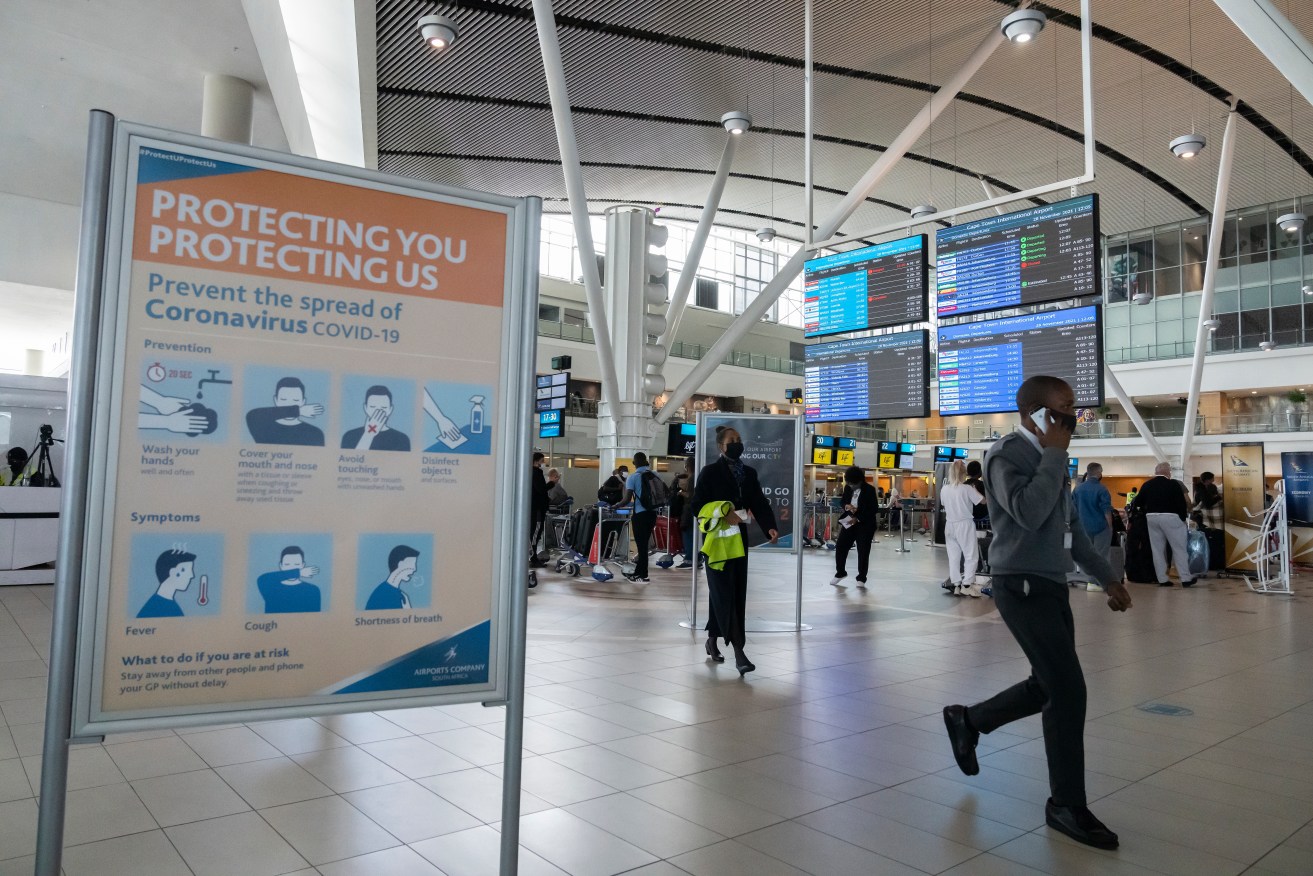Call to shut SA borders over new variant
The arrival of the new COVID-19 Omicron variant to Australia has prompted calls for South Australia to shut out new arrivals until more is known about it.

Flights from Cape Town and other South African airports have been restricted as some nations respond to the new COVID-19 variant. Photo supplied. EPA/Nic Bothma
Australian Medical Association state president Dr Michelle Atchison has called for the Marshall government to reimpose a blanket ban on international and interstate arrivals, to give scientists time to understand the new variant.
It comes after New South Wales confirmed at least two cases of the Omicron, which is believed to be more contagious but may also be milder, among two travellers on a Doha to Sydney flight.
Two other suspected cases are under investigation, including a traveller who also went through Victoria.
“It seems to be more infectious but whether it is more likely to cause illness or get around our vaccines we don’t know yet,”Atchison told InDaily.
“In South Australia we’ve learnt with COVID we need to go hard and quickly. It’s already in Australia and there’s already a cloud over NSW and Victoria — the conservative and safe thing would be to put a pause on travel and close the borders.”
Atchison said the SA government’s move on Sunday to once again require 14 days quarantine for fully vaccinated international arrivals is insufficient and borders should to be closed “full stop”.
She said the pause might only need to be for a week or two as scientists race to understand the new variant, which genome sequencing specialists in South Africa sounded the alarm on last week.
SA Health over the weekend also changed testing requirements for travellers from NSW, Victoria and the ACT, requiring them to show proof of a negative COVID test 72 hours before boarding a flight to SA.
The federal government over the weekend responded to the news by shutting Australia’s border to nine countries in southern Africa.
Federal health minister Greg Hunt on Monday said that the National Cabinet would meet in the next two days to discuss additional measures, and that he has asked the Australian Technical Advisory Group on Immunisation to review the timing for booster shots.
“We will not hesitate to take additional steps if the medical evidence is that more are required,” Hunt said.
He added the national security committee will meet today to reconsider plans to allow fully vaccinated temporary migrants and international students to enter Australia from December 1.
Preliminary evidence indicates that the Omicron variant spreads faster than any current COVID-19 strain and has more than 30 mutations.
Adelaide GP and chairman of the Immunisation Coalition Dr Rod Pearce told InDaily he felt it was premature to abandon the state border reopening plan until more is understood about the new variant.
“The feeling at the moment is it is less severe but possibly more transmissible, and if that is the case and vaccination means the new variant only confers mild disease, then the threat to hospitals is not high,” he said.
Pearce said that the new variant emphasises the need for South Australian medical practices to make sure they are ramping up their COVID prevention measures, making sure in-clinic patients are double vaccinated and encouraging any patients with respiratory illness to get tested.
“What we put in place last week [the border reopening] is that COVID is coming to South Australia, and the new variant just reinforces that,” he said.
“Before COVID was kind of a story that happens in Sydney and Melbourne and we better look out in case it gets here, but now it really is here and people can’t just go through the motions.”
WA Premier Mark McGowan cited the threat of Omicron as justification for imposing mandatory 14 days quarantine on arrivals from South Australia over the weekend.
“Lots of people are coming in with cases into South Australia who are then being managed in a home quarantine arrangement … the prospect is the Omicron variant could get into Adelaide and South Australia,” McGowan said.
South Australia has recorded eight interstate acquired COVID-19 cases since opening its borders to the eastern states on November 23, although authorities are yet to detect any instance of community transmission.
South Australian Premier Steven Marshall labelled WA’s decision a “massive inconvenience” for travellers.
“Obviously, [it’s] hugely impactful for people who are looking to go to Western Australia, we still haven’t had community transmission in South Australia but Western Australia are being very very careful, but very very inconvenient for many people who were planning to travel there,” he said on Sunday.




